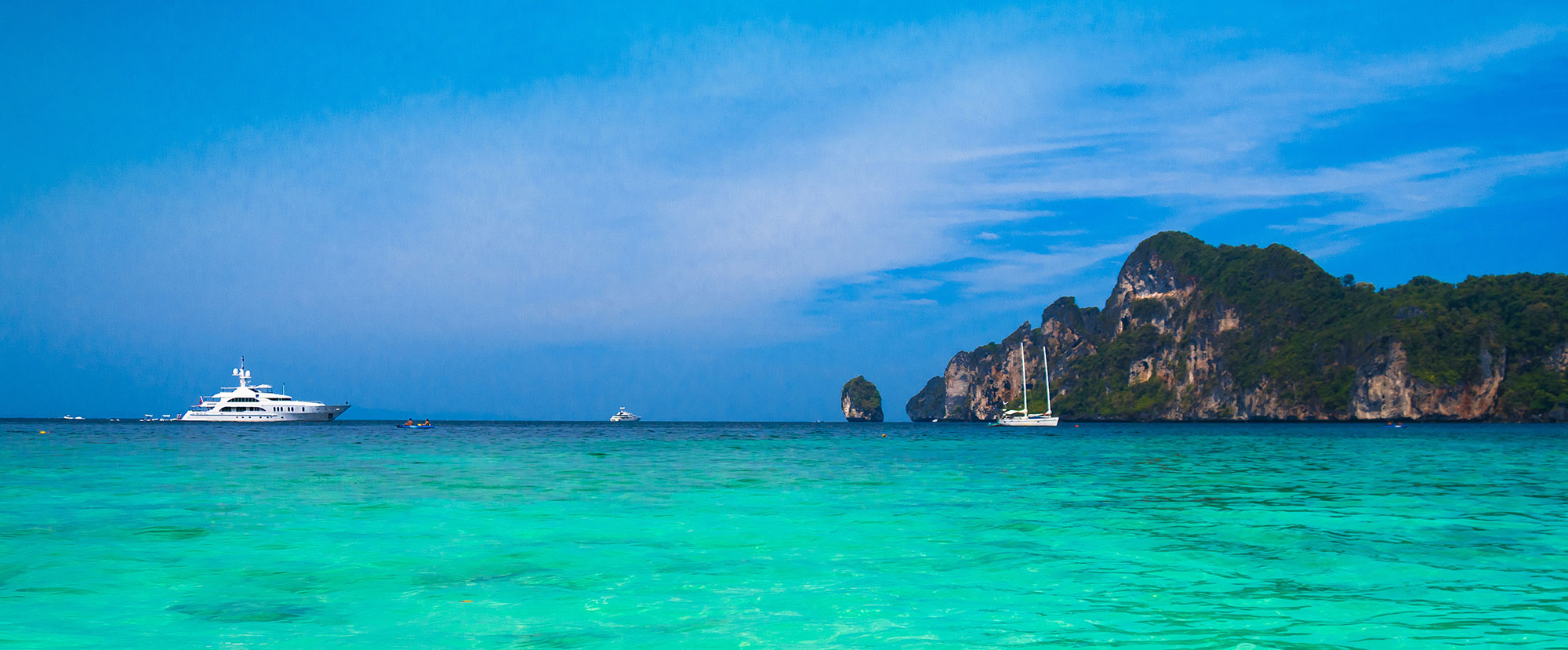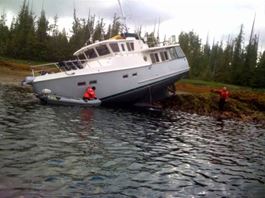
News Details
11 TOP CAUSES OF BOATING ACCIDENTS Posted on March 31, 2015

Boating accidents make the news for some reason — even when auto accidents don’t. There seems to be something more out of the ordinary, and thus newsworthy, about encountering tragedy while having fun than, say, while driving to the grocery. But when you examine boating accidents and their causes, you find that most of the worst of them actually stem from the most mundane events.
1. Running Out of Gas
Running out of gas on the highway is no biggie. Call AAA. Even on the water, you can often call one of the towing agencies and it’ll bring you enough fuel to get you to port for a fair fee. But run out of gas in the middle of the Gulf Stream or at the headwaters of Niagara Falls — it’s happened more than you care to guess — and the situation can fast become dire. In the Gulf Stream, unless you have an EPIRB or satellite phone, or unless someone is in range of your VHF, you could be stranded indefinitely.
How can this happen, you ask? Well, you can miscalculate your return bearing and find yourself far from the inlet and far beyond your fuel range. Or you may have to skirt unexpected storms or even run offshore to avoid them. So, before you leave the dock, take stock of what you plan to do. Calculate the fuel you think you’ll need to go out, play or fish, and return safely to port. Then add 10 to 20 percent more. If I’m going 25 miles offshore to fish, I figure 15 gallons out, 15 gallons back and 15 gallons to fish. Then I add an additional 5 to 10 gallons for a safety margin.
2. Running Aground
Usually, grounding your boat is only an embarrassment — but not always. I used to commute by boat from home to our resort and marina on Lake of the Ozarks. At least once per summer, I’d come upon a boat far up in the woods on an early Sunday morning. The partyers had been out late the night before, drinking too much, driving too fast and missing the cues that they were coming up on hard ground. On one occasion the boat — visible through the swath it had cut through the trees until a big oak stopped it — was clearly bloody. It’s not the grounding that hurts you — it’s the sudden stop.
Many times grounding leaves you in the water but on a sandbar. Too many boaters are eager to yank their craft off the rocks and end the humiliating saga. But don’t do it until you’ve gone below to make sure the bilge is not filling with water through a crack in the hull. It’s better to be safely aground than sinking.
3. Falling Overboard
Falling overboard is another event that’s usually little more than a short-lived — albeit wet — humiliation. But if you hit your head on the way out of the boat and knock yourself unconscious, you won’t float face up. Wear a life jacket.
Of particular danger to solo boaters who fall overboard is that the vessel is likely to continue on without you until it runs out of gas. Some boats turn in a hard circle, surrounding you in wakes and threatening to run you down. Wear the emergency cut-off switch lanyard so that, if you are tossed from the helm, the boat stops in its tracks.
4. Sinking
The most likely cause of sinking is laughably simple: a hole in the boat. How do they get there when you’ve never hit anything? Through-hull fittings. They bring water in or out through the hull, and these connections are vulnerable. Bronze through-hulls are best, but stray electrical current in the water from other boats or from pier wiring can dissolve them.
Plastic through-hulls are vulnerable to a mechanic’s misstep — one could break substantially and begin leaking later, only when the boat begins cruising in rough waters. Wiggle the through-hulls, looking for loose connections or other damage. Also, inspect the bilge before departing, and make sure the bilge pump is working properly and the garboard plug—many call it the bilge plug—is in place. Keep available a handful of wooden bungs (tapered pegs you can pound into a broken through-hull to stop the water).
5. Catching Fire
Fire on board is becoming increasingly rare, since boats are built with more-spark-protected mechanical systems and double-clamped fuel lines, but it still happens. I’ll never forget a group of partyers that rented one of our boats. They took off smoking and returned hours later with beer cans strewn through the boat; they’d acquired their brews after departing. When the boat slid into the slip, it was apparent it had had a catastrophic fuel leak. Gas had dissolved the carpet glue and it was drenched with fuel. Fumes glistened above the gunwale, and, to my horror, two of the boaters had cigarettes dangling from their lips. They were clearly too drunk to understand the danger they were in.
Always sniff the bilge for stray fuel fumes before departing. Look for signs of leakage like obvious fuel on the bottom or a rainbow-like slick on bilge water, and never start a marine engine without running the bilge blower at least five minutes. Make sure you have the proper fire extinguishers on board for fuel or electrical fires, and make sure they remain charged from season to season. Have them inspected by a fire department, or simply replace them if the charge gauge drops out of the green.
6. Breaking Down
According to U.S. Coast Guard statistics, many serious accidents occur due to mechanical failure. A faulty battery could mean the boat won’t start; if it happens at night, the light won’t work either. At that time, your boat is stranded, helpless and practically invisible.
Many boats are now equipped with absorbed glass mat batteries that require no maintenance and don’t leak or boil off battery acid. They will stand you in good stead. But, if you have a flooded cell battery, be sure to check it for proper fluid levels every weekend. Add only distilled water as necessary. Monitor engine instrumentation to keep an eye on battery voltage; it should reflect no less than 12 volts. Be particularly careful to monitor battery levels when using the stereo or other 12-volt equipment on board. As a backup, carry a flashlight on board as a signal light, and definitely make sure the safety kit includes flares to mark your position.
7. Speeding at Night
One of the chief causes of boating accidents is failing to maintain a safe speed for the conditions. At night, you can’t always trust your senses to determine whether the way is clear. For example, another boat’s lights may have failed, creating a navigation hazard. The rules don’t forgive boaters who fail to travel at a reasonably safe speed for the environment, especially at night.
8. Lacking Proper Safety Gear
Too many boaters don’t pay attention to the safety gear on their boat. Often they’ll depart without the proper number and sizes of life jackets. I once rescued three boaters when their boat sank. One was a small child who couldn’t keep his head above water without assistance because his father had put him in an adult-size life jacket. Make sure life jackets fit and are properly adjusted to the people who will be wearing them.
Others leave port without working flares, properly functioning running lights or horn, or alternative propulsion such as a canoe paddle (required in some locations). Boaters often overlook the safety value of anchors as well, thinking they are needed only for rare occasions. But an anchor is the first line of defense in a breakdown or storm. It keeps your boat safely in place should the engine fail.
9. Ignoring the Weather
I like some of the new stereo systems that also receive NOAA weather stations, enabling boaters to keep up with changing weather conditions. Handheld VHF radios also give NOAA forecasts. Keeping an eye on the weather is as important as maintaining a lookout while piloting a vessel. Don’t leave port on the news of questionable weather, and don’t leave port without even checking for that news. Poor visibility and high seas — even lightning or waterspouts — are among the risks boaters face if they ignore weather reports and don’t watch the horizon. The responsibility to successfully navigate such situations when you could have avoided them altogether falls directly on the shoulders of you, the skipper.
10. Failing to Maintain a Lookout
When there is a collision in boating, the reason tendered by the victims is usually, “I didn’t see them coming.” Well, it’s your job to see them coming. Whether at anchor or on the fly, maintaining a lookout is mandatory for safe boating.
11. Not Wearing a Life Jacket
We’ve talked about life jackets before. They save lives. In fact, according to Coast Guard statistics, about half of the drowning fatalities in boating involve boaters without life jackets. You might think having one nearby is good enough; you can always grab it as you need it. But it’s unlikely you’ll ever get it on once in the water. If the water is cold — say, 50-something degrees Fahrenheit — you have only a few moments of coordinated movement before your muscles shut down and you can’t hold your head out of the water. If you aren’t going to wear your life jacket at all times, be mindful of the most critical times. Keep it handy, and put it on in rough weather, during night passages and always in cold-weather boating situations — the numbers show that too many boaters who enter cold water unexpectedly die within minutes from being unable to get out of it.
Source: www.boatingmag.com